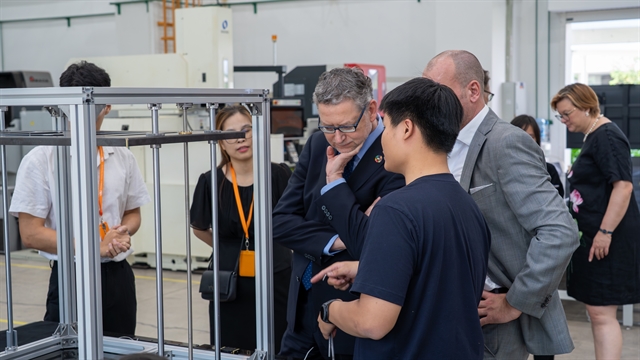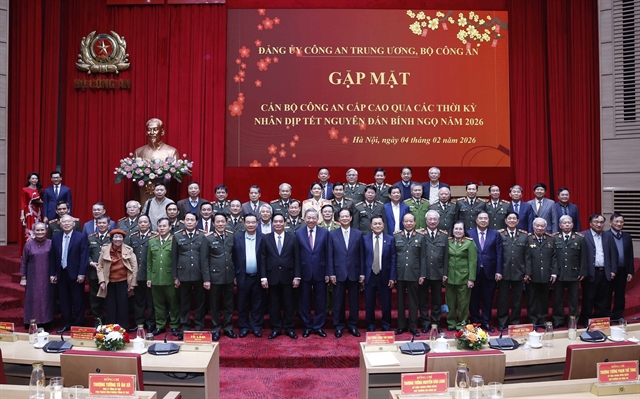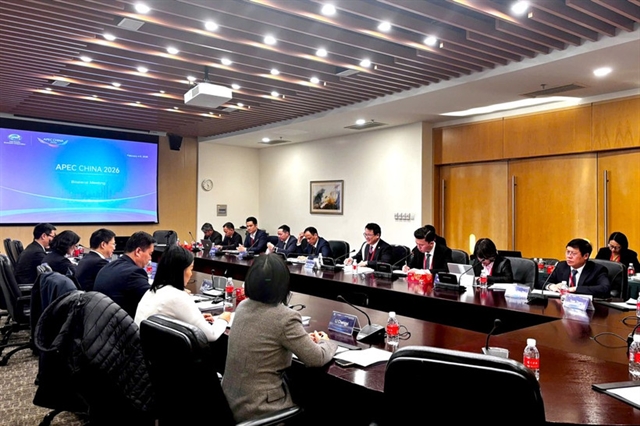

There is a drive to make sure that the Earth stops becoming too warm. To help achieve this, the capital city plans to keep a close watch on things like fires being burnt.

|
| Use of disposable plastic items should be stopped to reduce pollution. — Photo suckhoedoisong.vn |
HÀ NỘI — Hà Nội's Department of Natural Resources and Environment has outlined a plan to reduce air pollution in 2020.
'Green Initiatives for Hà Nội' will focus on air quality management, waste management, energy, urban planning, and green living with sustainable consumption.
The department will develop an air monitoring network using low-cost air pollution sensors in selected areas of the city to provide online updates for the public regarding pollution levels.
Air sensors will initially be installed in public places and 25 schools and offices in the city.
To increase public awareness about air pollution, regular activities will be held and the issue of air quality will be included in the school curriculum.
Waste management will include limiting the burning of agricultural waste, reducing plastic use and enhancing waste collection.
“Burning straw and agricultural waste is one of the main reasons for serious air pollution and increasing greenhouse gas emissions in the city,” said Lê Thanh Thuỷ, an expert from the department.
“The department will carry out a pilot programme to show farmers how to use probiotics to produce compost from straw,” she said.
To reduce the use of energy, efficiency models will be introduced including the use of energy-saving bulbs, and the use of renewable energy for cooking, heating and lighting.
The city will also carry out campaigns to reduce plastic waste, promote the use of environmentally-friendly products, set up green offices and promote organic agriculture.
“A green office is an environmental management system focusing on changing employees' perceptions and behaviour towards sustainable consumption practices. This helps solve existing problems and reduce costs and the environmental impacts of an organisation's activities to benefit the organisation and create a healthy, friendly working environment,” said Thuỷ.
Ambitious promise
The plan was introduced at a workshop dubbed “City Initiatives in Climate Change and the Key Progress in Developing City Promises” which was co-held by the department and the global network ICLEI - Local Governments for Sustainability.
The workshop was in the framework of the Ambitious City Promises campaign implemented by the ICLEI and funded by the International Climate Initiative under Germany’s Ministry of the Environment, Nature Conservation, Building and Nuclear Safety, which focuses on reducing greenhouse gas emissions through participatory and inclusive local climate action.
The project is designed to advance this work by increasing the capacity of local governments, engaging citizens and driving climate action through low emission strategies.
The Promise of Seoul which is at the heart of the project, is a comprehensive climate action plan launched by South Korea in 2015.
The Promise of Seoul selected Southeast Asian cities in Việt Nam’s Hà Nội, Sóc Sơn and Sơn Tây, Indonesia’s Jakarta, Bekasi and Tangerang, and the Philippines’ Pasig, Parañaque and Marikina to make ambitious commitments, mainstream low emission strategies and cultivate new climate champions in the region.
“The project aimed to call big cities in Southeast Asia with first countries of Việt Nam, Indonesia and the Philippines to commit cutting the greenhouse gas emission and support the cities to set up their action plans,” said Ranell Martin Dedicatoria from the ICLEI.
The engagement of governments from central to grassroots levels to activate climate change response was very significant, he said. — VNS
GLOSSARY
Hà Nội's Department of Natural Resources and Environment has outlined a plan to reduce air pollution in 2020.
To outline a plan means to come up with a plan and tell people about it without needing to go into great detail.
'Green Initiatives for Hà Nội' will focus on air quality management, waste management, energy, urban planning, and green living with sustainable consumption.
Consumption means use. Sustainable consumption means the use of something in such a way that it pays for itself.
The department will develop an air monitoring network using low-cost air pollution sensors in selected areas of the city to provide online updates for the public regarding pollution levels.
Monitoring means watching and taking records.
Sensors are devices that are used, in this case, to pick up where there is air pollution.
Air sensors will initially be installed in public places and 25 schools and offices in the city.
Initially means “firstly”.
Installed means “set up”
To increase public awareness about air pollution, regular activities will be held and the issue of air quality will be included in the school curriculum.
A curriculum is the collection of different subjects that make up a course.
Waste management will include limiting the burning of agricultural waste, reducing plastic use and enhancing waste collection.
Enhancing means improving.
“Burning straw and agricultural waste is one of the main reasons for serious air pollution and increasing greenhouse gas emissions in the city,” said Lê Thanh Thuỷ, an expert from the department.
Greenhouse gas emissions are made up of the warm gas that contributes to global warming. These gases are often let out of things like machines and vehicles.
An expert is someone who knows a lot about something.
“The department will carry out a pilot programme to show farmers how to use probiotics to produce compost from straw,” she said.
A pilot programme is an experiment.
Probiotics are very small living things.
To reduce the use of energy, efficiency models will be introduced including the use of energy-saving bulbs, and the use of renewable energy for cooking, heating and lighting.
Renewable energy is energy that is made from something that can be used again to make energy, such as sunlight and wind .
The city will also carry out campaigns to reduce plastic waste, promote the use of environmentally-friendly products, set up green offices and promote organic agriculture.
Organic agriculture is farming that does not use chemicals and fertilizers. To promote organic agriculture means to say nice things about it so that people think it would be a good idea to practise it.
“A green office is an environmental management system focusing on changing employees' perceptions and behaviour towards sustainable consumption practices.”
Perceptions are people opinions on things, whether they know much about them or not.
“This helps solve existing problems and reduce costs and the environmental impacts of an organisation's activities to benefit the organisation and create a healthy, friendly working environment,” said Thuỷ.
If activities benefit the organisation, they make it stronger.
The workshop was in the framework of the Ambitious City Promises campaign implemented by the ICLEI and funded by the International Climate Initiative under Germany’s Ministry of the Environment, Nature Conservation, Building and Nuclear Safety, which focuses on reducing greenhouse gas emissions through participatory and inclusive local climate action.
Implemented means “put a plan into effect”.
Participatory means “having people take part”.
Inclusive means “including people”.
The project is designed to advance this work by increasing the capacity of local governments, engaging citizens and driving climate action through low emission strategies.
The capacity of local governments means “what they can do”.
Local governments are district and provincial governments.
Low emission strategies are ways of making sure cars and factory engines do not let out too much gas that causes global warming.
The Promise of Seoul which is at the heart of the project, is a comprehensive climate action plan launched by South Korea in 2015.
The Promise of Seoul is a commitment the South Korean city made to take action against climate change.
A comprehensive climate action plan is one that looks at all aspects of a topic.
The Promise of Seoul selected Southeast Asian cities in Việt Nam’s Hà Nội, Sóc Sơn and Sơn Tây, Indonesia’s Jakarta, Bekasi and Tangerang, and the Philippines’s Pasig, Parañaque and Marikina to make ambitious commitments, mainstream low emission strategies and cultivate new climate champions in the region.
Commitments are promises people make to themselves, and keep, to do certain jobs and duties. An ambitious commitment is one that involves aiming high.
Mainstream strategies are ways of doing things in a normal, rather than an alternative way.
The engagement of governments from central to grassroots levels to activate climate change response was very significant, he said.
Grassroots means poor and rural communities.
A response is a reaction.
Significant means meaningful.
WORKSHEET
Find words that mean the following in the Word Search:
y | i | w | a | o | n | l | s | n | e |
w | c | g | r | u | b | p | c | r | l |
o | s | c | h | o | o | l | s | i | h |
b | e | t | u | o | d | m | t | v | o |
m | o | g | r | e | e | n | z | e | w |
o | u | z | b | a | n | e | r | d | a |
l | l | a | a | r | w | t | i | e | v |
t | u | k | n | l | e | a | n | l | i |
ANSWERS: 1. Schools; 2. Seoul; 3. Straw; 4. Green; 5. Urban.




